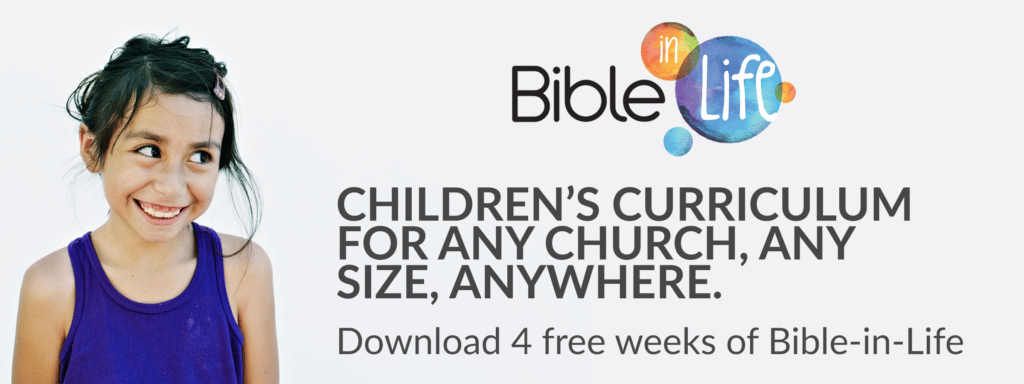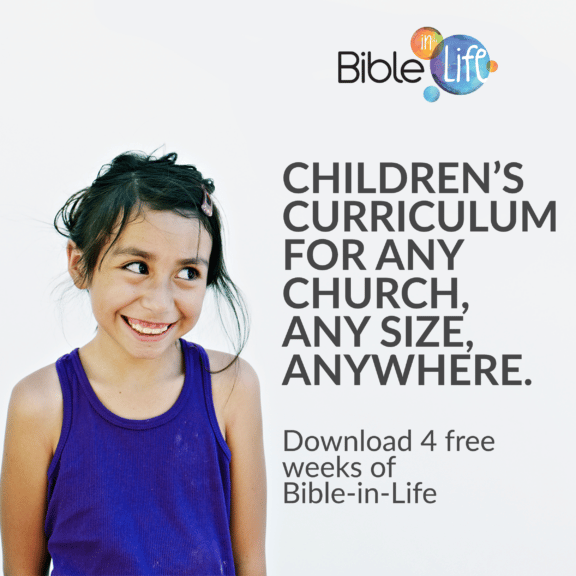The goal: Make a way for each child to have an everyday relationship with Jesus through understanding what God’s Word says.
Your ministry may offer a wide variety of programs or only one or two. Those programs may be simple or elaborate. But whatever programming you use—we all know and believe that it needs to be rooted firmly in God’s Word.
We don’t want to do children a disservice by merely entertaining them or only teaching them moral lessons. Christian education means that we teach what the Bible says. Then we help the students apply it to their lives every day.
And the only way for us to really show them how to consistently live out God’s Word is through the relationships we, as leaders and volunteers, are building with them and their families. And if we are working to build strong relationships, on top of all the other things we do, then we likely don’t have time to write our own curriculum.
This feels even more true with the extra challenges we face today. We have some children attending church in person, some only attending online, while others aren’t attending at all. It seems we have to spend even more time building and nurturing our relationships. And it takes more time to adapt and train for the curriculum we do have.
This is why focusing in on the most important things for your ministry is especially key in this time. Things like redefining your mission, building your volunteers, and connecting with the families in your ministry. And if you are like many of us, you are already stretched thin.


What to Consider
While it may be tempting to write your own curriculum, there are several points to consider:
- First, it often becomes time consuming and frustrating to reinvent the wheel.
- Second, it is harder to recruit volunteers when the materials aren’t consistent, age-appropriate, attractive to children, or complete. It can lack appropriate visuals and student materials that help keep children’s interest and reinforce the information given in the lesson.
- Third, self-published curriculum may not provide an in-depth approach to Bible coverage. Children may be exposed only to parts of the Bible that appeal to the writers.
Effective Teaching
So, is the best answer to simply open a Bible and read it aloud to children? Not usually. Although that certainly has value in some circumstances.
For effective teaching, children need to learn what God’s Word says in ways that have meaning for them, here and now! Otherwise, a child’s mind has no mental hooks upon which to hang the information they learned.
It often becomes time consuming and frustrating to reinvent the wheel.
Because children are active and curious, teaching them God’s Word needs to be done in a way that enables each one to understand and then live out Bible truths. This is where the value of good curriculum shines—it is designed to make Bible teaching effective! But how should you measure a curriculum?
- Knowledge of God’s Word
Is the material consistently biblical? How does it prepare the teacher spiritually to teach? What does it teach the children?
- Knowledge of children
How does the curriculum make Bible truth understandable to children? Are concepts clearly and appropriately presented to the age group for which it is written?
- Knowledge of effective teaching techniques
How does the curriculum help the teacher understand the children and their abilities? How does it help teachers learn ways to talk to children, to discipline without distracting, etc.? Is it easily adaptable for different teaching situations?
Relational Teaching

Good curriculum should help the teacher achieve the goal. The goal: Make a way for each child to have an everyday relationship with Jesus through understanding what God’s Word says. An important part of that kind of teaching comes through relationship with a teacher who models the love of God in their lives.
Relational teaching involves children in the learning, so they can discover truth for themselves. Rather than entertaining children, relational teaching excites them about learning and understanding God’s Word. And then it helps them know how to live out what they now understand.
Relational teaching also encourages teachers in effective ways to build relationship. This challenges teachers to live in a way that is consistent with their words!
Published curriculum follows a set scope and sequence so that over time, children learn foundational theological concepts. It does this through solid Bible teaching presented in age-appropriate ways.
If we are working to build strong, lasting relationships, then we likely don’t have time to write our own curriculum.
It is usually said that the benefit of writing one’s own curriculum is that a church can address specific needs that God has brought to their attention.
However, the best course is usually to find a curriculum resource and customize it for your particular needs. If choosing curriculum for more than one part of your program, try to keep material consistent in both its teaching philosophy and its doctrine.
Training teachers and teaching children is easier when your church’s educational philosophy is consistent and well understood.
Teachers will teach more effectively by gaining proficiency with one particular curriculum. This helps with consistency, rather than adapting to a variety of materials with differing or even conflicting educational and biblical principles.
Compare Curriculum Options
You can have an effective program in this season, but you need time and space to focus on the big picture—relationship. Use the following rating scale and questions to help rate your curriculum options:
5 = Superior | 4 = Excellent | 3 = Good | 2 = Fair | 1 = Poor
Bible Content and Usage
____ Is the curriculum designed to teach the Bible as God’s inspired and authoritative Word?
____ Is there balanced coverage of the Old and New Testaments?
____ Does the overall plan of the curriculum point students to faith in Christ as Savior and Lord, and also nurture and guide them to “grow up in Christ”?
____ Does the material present Bible truths in a manner appropriate to the abilities and development of the students?
____ Are hands-on Bible usage and skill development encouraged at appropriate age levels?
Teacher

____ Does the curriculum challenge the teacher to prepare spiritually for the task of teaching?
____ Is the material clearly arranged to show the teacher an understandable and logical lesson plan?
____ Are the Bible-learning and life-response aims specifically and clearly stated for each lesson?
____ Does the material provide the teacher with a variety of Bible learning activities?
____ Are the materials clearly presented, enabling the teacher to be prepared with a reasonable amount of effort?
____ Are there enough ideas and suggestions to adapt the material for longer or shorter sessions, larger or smaller groups, or limited equipment?
____ Does the curriculum give teaching tips to improve teachers’ skills?
Student
____ Is the vocabulary appropriate for the age and abilities of the students?
____ Does the curriculum provide a variety of ways for students to participate actively in the learning process?
____ Are the student materials attractive, and do they encourage involvement?
____ Do the teacher resources provide a variety of attractive aids to stimulate student interest and involvement?
____ Are the Bible-learning activities appropriate to the mental, spiritual, social, and physical development of the students?
Beyond the Classroom
____ Does the material provide ideas for making and sustaining meaningful contact with both students and families outside the classroom?
____ Do the take-home papers contain activities that assist the family in relating the student’s learning to everyday life?
____ Will the curriculum speak to issues relevant to the students’ everyday life?
____ Does the curriculum provide materials and suggestions for ways students may understand the privilege and joy of sharing Christ?
____ Will the curriculum encourage outreach and church growth?
Use our curriculum checklist for further help in determining the best curriculum for your ministry.











